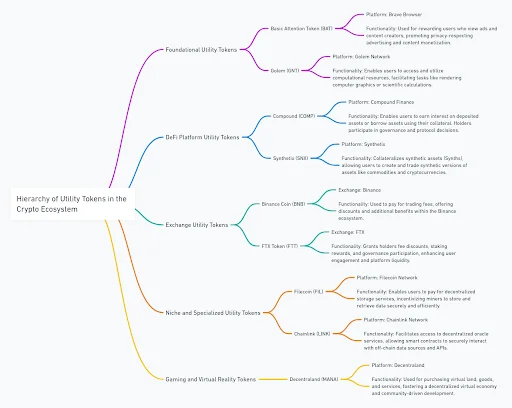Introduction
Utility tokens are a specific category of cryptocurrencies designed to provide access to goods or services within a blockchain ecosystem. Unlike traditional cryptocurrencies like Bitcoin, which primarily serve as digital currencies or stores of value, utility tokens have specific use cases and functionalities tied to their respective platforms or applications.
Hierarchy of Utility Tokens

1. Foundational Utility Tokens
These tokens are integral to major blockchain platforms and widely used decentralized applications, providing essential functionalities and access to core services within their respective ecosystems.
- Basic Attention Token (BAT):
- Platform: Brave Browser
- Functionality: BAT tokens are used for rewarding users who view ads and content creators within the Brave ecosystem, promoting privacy-respecting advertising and content monetization.
- Golem (GNT):
- Platform: Golem Network
- Functionality: GNT tokens enable users to access and utilize computational resources on the Golem decentralized network, facilitating tasks such as rendering computer graphics or scientific calculations.
2. DeFi Platform Utility Tokens
Utility tokens associated with decentralized finance (DeFi) platforms play crucial roles in facilitating financial services, transactions, and interactions within decentralized ecosystems.
- Compound (COMP):
- Platform: Compound Finance
- Functionality: COMP tokens provide utility by enabling users to earn interest on deposited assets or borrow assets using their collateral within the Compound lending protocol. Holders of COMP also participate in governance and protocol decisions.
- Synthetix (SNX):
- Platform: Synthetix
- Functionality: SNX tokens collateralize synthetic assets (Synths) within the Synthetix platform, allowing users to create and trade synthetic versions of assets like commodities and cryptocurrencies.

3. Exchange Utility Tokens
Tokens associated with cryptocurrency exchanges offer users benefits such as fee discounts, enhanced trading functionalities, and participation in platform-specific activities.
- Binance Coin (BNB):
- Exchange: Binance
- Functionality: BNB tokens are used to pay for trading fees on the Binance exchange, offering discounts and additional benefits for users within the Binance ecosystem, including token sales and decentralized finance (DeFi) applications on the Binance Smart Chain.
- FTX Token (FTT):
- Exchange: FTX
- Functionality: FTT tokens provide utility by granting holders fee discounts, staking rewards, and governance participation within the FTX exchange platform, enhancing user engagement and platform liquidity.
4. Niche and Specialized Utility Tokens
These tokens cater to specific industries, applications, or use cases within the crypto ecosystem, offering unique functionalities and services tailored to niche markets.
- Filecoin (FIL):
- Platform: Filecoin Network
- Functionality: FIL tokens enable users to pay for decentralized storage services on the Filecoin network, incentivizing miners to store and retrieve data securely and efficiently.
- Chainlink (LINK):
- Platform: Chainlink Network
- Functionality: LINK tokens facilitate access to decentralized Oracle services on the Chainlink network, allowing smart contracts to securely interact with off-chain data sources and APIs.
5. Gaming and Virtual Reality Tokens
Tokens are used within gaming platforms and virtual reality environments to purchase virtual goods, access content, and participate in in-game economies.
- Decentraland (MANA):
- Platform: Decentraland
- Functionality: MANA tokens are used for purchasing virtual land, goods, and services within the Decentraland virtual reality platform, fostering a decentralized virtual economy and community-driven development.
Characteristics of Utility Tokens
- Purpose-Driven: Utility tokens are created with the primary purpose of facilitating access to products, services, or functionalities within decentralized applications (dApps) or platforms.
- Smart Contract Integration: They often operate on blockchain platforms that support smart contracts (e.g., Ethereum), enabling programmable features and functionalities that automate transactions and enforce token usage rules.
- Token Standards: Utility tokens typically adhere to token standards such as ERC-20 (fungible tokens) or ERC-721 (non-fungible tokens/NFTs), depending on whether they represent interchangeable units or unique digital assets.
How Utility Tokens Work
Utility tokens function through the execution of smart contracts, which define the token’s behavior and interactions within the blockchain ecosystem. Key aspects of how they work include:
- Access and Usage: Holders of utility tokens can use them to access specific features, services, or content within dApps or platforms. For example, paying for transaction fees, unlocking premium features, or purchasing digital goods.
- Transaction Facilitation: Utility tokens facilitate transactions within their respective ecosystems, acting as a medium of exchange for accessing decentralized services or executing transactions between users and service providers.
- Tokenomics: The design of utility tokens includes economic incentives and mechanisms (e.g., staking, rewards) to encourage token holding, usage, and participation within the ecosystem, thereby promoting network effects and sustainability.

Functionality and Use Cases
Utility tokens serve various functions and use cases within decentralized applications and platforms, including:
- Access and Membership: Providing access to premium features, content, or functionalities within decentralized platforms. Examples include accessing specific software services, digital content, or enhanced platform capabilities.
- Incentive Mechanisms: Rewarding users for participating in network activities such as staking tokens for governance, contributing to liquidity pools, or performing specific tasks that benefit the ecosystem.
- Governance Participation: Enabling holders to participate in governance processes by voting on proposals, protocol upgrades, or changes to ecosystem parameters. Governance tokens often overlap with utility tokens in platforms where holders must use tokens to participate in governance.
- Transaction Medium: Acting as a medium of exchange within decentralized marketplaces, gaming platforms, social networks, and other applications where users trade goods or services directly using utility tokens.
Examples of Utility Tokens
- Basic Attention Token (BAT): Used within the Brave browser ecosystem to reward users for viewing ads and to compensate content creators based on user attention.
- Chainlink (LINK): Facilitates access to off-chain data and services on the Chainlink decentralized oracle network, enabling smart contracts to interact with real-world data sources.
- Decentraland (MANA): Powers transactions and interactions within the Decentraland virtual reality platform, allowing users to buy virtual land, goods, and services.
Conclusion
Utility tokens play a critical role in enhancing functionality, usability, and engagement within blockchain ecosystems by providing access to specific services, incentivizing user participation, and facilitating transactions. Their integration with smart contracts and adherence to blockchain standards ensure transparency, security, and programmability, enabling innovative applications across various industries and use cases within the decentralized economy.



